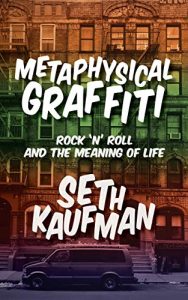What is it about great rock music that gets us to listen, to dance and sing along, to become fans, to pledge our undying allegiance, to follow a band obsessively, to buy books about the bands we love, or — never mind spending time reading those books — to actually devote hours, days, weeks and years to writing them in the first place?
There are a multitude of reasons. A song or band or album appeals to your identity. Music has a great hook or melody or lyric that fits your taste for whatever reason. It’s sexy and wild. It’s poetic. Or, as the articulate kids on American Bandstand used say: “It’s got a good beat and you can dance to it.”
I submit one factor is more vital than all the others.
But to get at this quality, I’m going to turn to literature for a few paragraphs, and specifically, Philip Roth.
Even though Roth was a guy given to listening to and extolling the transcendent virtues of the string quartet, the late master was arguably the most rock ’n‘ roll writer in American history. He wrote about sex, America, baseball, Jews, politics, and race in frank, honest, hilarious, outrageous and moving ways. If you think the Sex Pistols were shocking in their name, attitudes and nihilism, they had nothing on Roth, who was a punk before punk. Not in a music or fashion sense, but in his profound work’s ability to shock. Portnoy’s Complaint stunned everyone with its blunt, hilarious embrace of sexual obsession, inducing tears of laughter as the titular hero Alexander Portnoy recalled his teenaged self masturbating into a piece of liver pillaged from the icebox and then, once violated, returning it to the fridge. Later, the soiled piece of meat was cooked and served to his family. Top that, Johnny Rotten!
Years later, in Sabbath’s Theater, Roth’s anti-hero Mickey Sabbath visits a cemetery to spill his seed upon the grave of his great love — and finds a romantic rival doing the very same thing.
But Roth’s greatest contribution to understanding the power of rock ’n‘ roll has nothing to do with gags involving self-abuse. It comes from his novel I Married a Communist, which contains a vital lesson about writing and about criticism. And it is this lesson that can be applied to rock.
I Married a Communist centers on the recollections of Nathan Zuckerman, a frequent Roth narrator. This time out, Nathan recounts the life of his one-time idol, Ira Ringold, the strapping star of a popular radio drama. Young Nathan meets Ira and at one point they begin to discuss a Thomas Paine quote about King George that they both admire: “I should suffer the misery of devils, were I to be a whore of my soul by swearing allegiance to one whose character is that of a sottish, stupid, stubborn, worthless, brutish man.”
Ira asks Nathan why he likes the quote, and they discuss the phrase “whore of my soul.” Nathan concludes it’s more powerful than saying, “were I to sell my soul.” And he explains to Ira:
“People don’t go around writing ‘whore’ in public, saying ‘whore.’”
“Why don’t they?”
“Shame. Embarrassment. Propriety.”
“Propriety. Good. Right. So this is audacious, then.”
“Yes.”
“And that’s what you like about Paine, isn’t it. His audacity!”
“I think so. Yes.”
“And now you know why you like what you like. You’re way ahead of the game, Nathan. And you know it because you looked at one word he used, just one word, and you thought about that word he used, and you asked yourself some questions about that word he used, until you saw right through that word, saw through it as through a magnifying glass, to one of the sources of this great writer’s power. He is audacious. Thomas Paine is audacious. But is that enough? That is only a part of the formula. Audacity must have a purpose, otherwise it’s cheap and facile and vulgar…”
And there you have it: Audacity is rock’s secret weapon (not to mention Roth’s). What is audacity? Dictionaries offer two meanings. The first is “the willingness to take bold risks,” and the second is “rude, disrespectful behavior.” In many instances, that second definition is an intrinsic part of the first. Taking risks challenges orthodoxy, and challenging orthodoxy is, at least to those who adhere to the status quo, often perceived as rude and disrespectful. The word is similar to another term often associated with rock, rebellion — the act of resisting authority or convention — but without its willful, focused opposition. Being audacious isn’t simply saying “no” to something; it’s actively, creatively saying yes to something else.
At its root, rock ’n‘ roll is an audacious art form. From its earliest R&B incarnations it was louder, more provocative and more aggressive than what had come before. It was sexier, dirtier and funnier, too. The pioneers of rock, Louis Jordan, Big Joe Turner, and others, offered witty and often wicked double-entendre fun in songs like “Shake, Rattle & Roll” (“I’m like a one-eyed cat/peepin’ in a seafood store.”)
Later, Elvis Presley enhanced that beat with a few pelvic thrusts. Meanwhile, in New Orleans, Esquerita and Little Richard would bring outrageous — for its time — androgyny to the art form. Audacity expanded from sound and words and dance into clothing and style; there were rockers and greasers and mods. Eventually, the Beatles had the audacity to transform from adorable mop tops to shaggy hippies.
But rock’s audacity wasn’t just confined to sound or style. The elastic superpower of audacity allowed rock itself to morph and grow. The kind of music, the instrumentation, the sound of the recordings and the subject matter of the songs are all up for grabs, thanks to audacity.
There has been an endless stream of audacious acts and moments and records in rock ’n‘ roll history: dirty ditties of hokum blues, Little Richard and his flamboyant stage persona, Chuck Berry’s duck walks, Elvis and his pelvis, the Beatles, Dylan going electric, the Stones, the very idea of Woodstock, Jimi Hendrix reinventing the electric guitar, the Velvet Underground blending noise and psychedelia, the costumes of Kiss, the Sex Pistols, the brazen plagiarism and inventiveness of the Sugar Hill Gang, the sci-fi androgyny of David Bowie, the violence and ambition of the Who, the political moxie of Public Enemy, the sexuality of Madonna, the visionary sound of My Bloody Valentine. Many on that short list had unique, often outrageous stage personas that made them instantly noticeable. But many had audacious musical ideas. The best had both.

Originally published in somewhat different form in Metaphysical Graffiti: Rock ‘n’ Roll and the Meaning of Life, by Seth Kaufman. Published by O/R Books.


